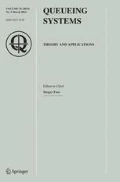Abstract
The Skorokhod problem arises in studying reflected Brownian motion (RBM) and the associated fluid model on the non-negative orthant. This problem specifically arises in the context of queueing networks in the heavy traffic regime. One of the key problems is that of determining, for a given deterministic Skorokhod problem, whether for every initial condition all solutions of the problem staring from the initial condition are attracted to the origin. The conditions for this attraction property, called stability, are known in dimension up to three, but not for general dimensions. In this paper we explain the fundamental difficulties encountered in trying to establish stability conditions for general dimensions. We prove the existence of dimension \(d_0\) such that stability of the Skorokhod problem associated with a fluid model of an RBM in dimension \(d\ge d_0\) is an undecidable property, when the starting state is a part of the input. Namely, there does not exist an algorithm (a constructive procedure) for identifying stable Skorokhod problem in dimensions \(d\ge d_0\).
Similar content being viewed by others
References
Chen, H., Yao, D.: Fundamentals of Queueing Networks: Performance, Asymptotics and Optimization. Springer, Berlin (2001)
Harrison, J.M.: Brownian Motion and Stochastic Flow Systems. Krieger, Malabar (1990)
Williams, R.J.: Semimartingale reflecting Brownian motions in the orthant. In: Kelly, F.P., Williams, R.J. (eds.) Stochastic Networks, IMA Volumes in Mathematics and Its Applications, vol. 71, pp. 125–137. Springer, New York (1995)
Budhiraja, A., Lee, C.: Stationary distribution convergence for generalized Jackson networks in heavy traffic. Math. Oper. Res. 34, 45–56 (2009)
Gamarnik, D., Zeevi, A.: Validity of heavy traffic steady-state approximations in open queueing networks. Ann. Appl. Probab. 16(1), 56–90 (2006)
Dupuis, P., Williams, R.J.: Lyapunov functions for semimartingale reflecting Brownian motions. Ann. Probab. 22, 680–702 (1994)
Bramson, M.: A positive recurrent reflecting Brownian motion with divergent fluid path. Ann. Appl. Probab. 21(3), 951–986 (2011)
El Kharroubi, A., Ben Tahar, A., Yaacoubi, A.: Sur la récurrence positive du mouvement brownien réflechi dans l’orthant positif de \({\bf R}^n\). Stoch. Stoch. Rep. 68, 229–253 (2000)
El Kharroubi, A., Ben Tahar, A., Yaacoubi, A.: On the stability of the linear Skorohod problem in an orthant. Math. Methods Oper. Res. 56, 243–258 (2002)
Bramson, Maury, Dai, J.G., Michael Harrison, J.: Positive recurrence of reflecting Brownian motion in three dimensions. Ann. Appl. Probab. 20(2), 753–783 (2010)
Gamarnik, D.: On deciding stability of constrained homogeneous random walks and queueing systems. Math. Oper. Res. 27(2), 272–293 (2002)
Gamarnik, D.: Computing stationary probability distribution and large deviations rates for constrained homogeneous random walks. The undecidability results. Math. Oper. Res. 27(2), 272–293 (2007)
Gamarnik, D., Katz, D.: On deciding stability of queueing networks under priority scheduling policy. Ann. Appl. Probab. 19, 2008–2037 (2009)
Fayolle, G., Iasnogorodski, R., Malyshev, V.A.: Random Walks in the Quarter-Plane: Algebraic Methods, Boundary Value Problems and Applications, vol. 40. Springer, Berlin (1999)
Fayolle, G., Malyshev, V.A., Menshikov, M.V.: Topics in the Constructive Theory of Countable Markov Chains. Cambridge University Press, Cambridge (1995)
Malyshev, V.A.: Classification of two-dimensional positive random walks and almost linear semimartingales. Dokl. Akad. Nauk SSSR 202, 526–528 (1972)
Menshikov, M.V.: Ergodicity and transience conditions for random walks in the positive octant of space. Soviet. Math. Dokl. 217, 755–758 (1974)
Dai, J.G.: On the positive Harris recurrence for multiclass queueing networks: a unified approach via fluid models. Ann. Appl. Probab. 5, 49–77 (1995)
Malyshev, V.A.: Networks and dynamical systems. Adv. Appl. Probab. 25, 140–175 (1993)
Sipser, M.: Introduction to the Theory of Computability. PWS, Boston (1997)
Goodman-Strauss, C.: Can’t decide? undecide!. Not. Am. Math. Soc. 57, 343–356 (2010)
Blondel, V.D., Bournez, O., Koiran, P., Papadimitriou, C.H., Tsitsiklis, J.N.: Deciding stability and mortality of piecewise affine systems. Theor. Comput. Sci. 225(1–2), 687–696 (2001)
Blondel, V.D., Tsitsiklis, J.N.: The boundedness of all products of a pair of matrices is undecidable. Syst. Control Lett. 41(2), 135–140 (2000)
Blondel, V.D., Tsitsiklis, J.N.: A survey of computational complexity results in systems and control. Automatica 36(9), 1249–1274 (2000)
Hopcroft, J., Ullman, J.: Formal Languages and Their Relation to Automata. Addison-Wesley, Boston (1969)
Rogozhin, Y.: Small universal Turing machines. Theor. Comput. Sci. 168(2), 215–240 (1996)
El Kharroubi, A., Bernard, A.: Réflexions (ou régulations) de processus dans le premier “orthant” de \({\bf R}^n\). C. R. Acad. Sci. Paris Sér. I Math. 309, 371–375 (1989)
El Kharroubi, A., Bernard, A.: Régulations déterministes et stochastiques dans le premier “orthant” de \({\bf R}^n\). Stoch. Stoch. Rep. 34, 149–167 (1991)
Taylor, L.M., Williams, R.J.: Existence and uniqueness of semimartingale reflecting Brownian motions in an orthant. Probab. Theory Relat. Fields 96, 283–317 (1993)
Hooper, P.: The undecidability of the Turing machine immortality problem. J. Symb. Logic 2, 219–234 (1966)
Minsky, M.L.: Recursive unsolvability of Post’s problem of “tag” and other topics in theory of Turing machines. Ann. Math. 74, 437–455 (1961)
Acknowledgments
With great pleasure we acknowledge several enlightening discussions with Maury Bramson. David Gamarnik: This work was supported by NSF Grant CMMI-0726733
Author information
Authors and Affiliations
Corresponding author
Additional information
Dedicated to the memory of A.V. Skorokhod.
Rights and permissions
About this article
Cite this article
Gamarnik, D., Katz, D. The stability of the deterministic Skorokhod problem is undecidable. Queueing Syst 79, 221–249 (2015). https://doi.org/10.1007/s11134-014-9424-8
Received:
Revised:
Published:
Issue Date:
DOI: https://doi.org/10.1007/s11134-014-9424-8


